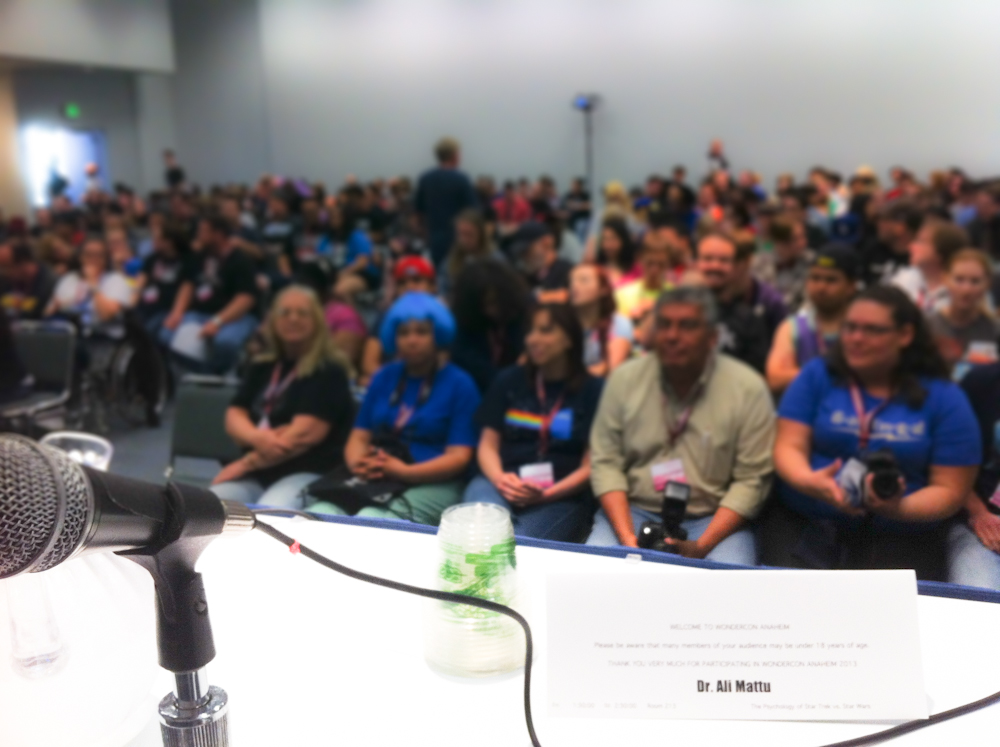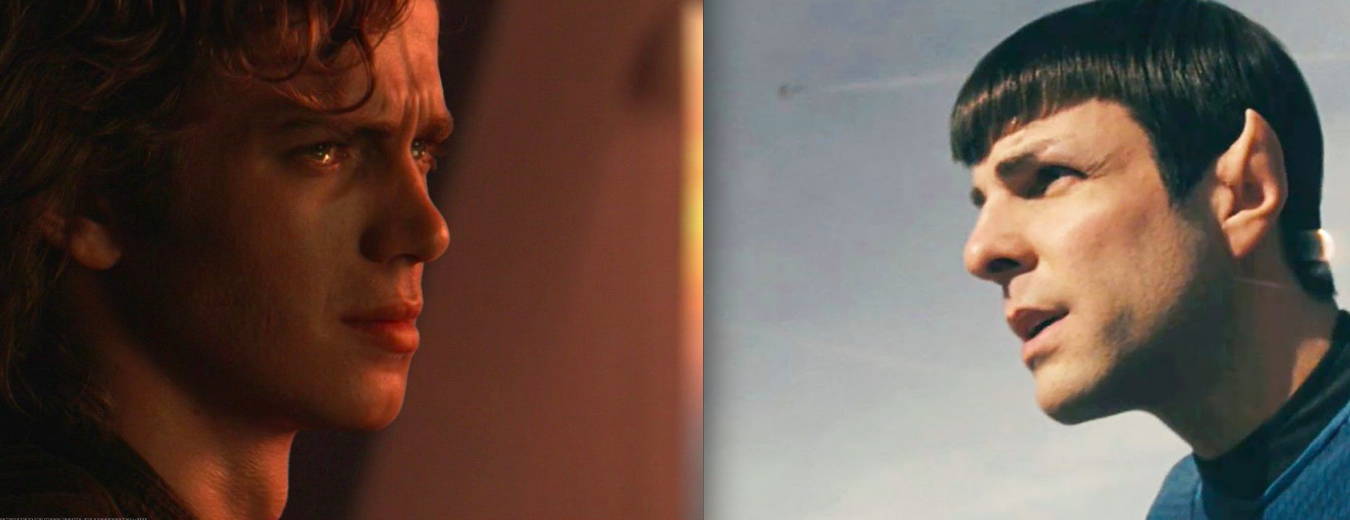I had a blast last week at WonderCon 2013 geeking out about
science fiction, fantasy, and comics. The highlight was a panel I developed
with my colleague, Andrea Letamendi, on the psychology of Star Trek versus Star
Wars. Not only did we have some fantastic panelists including Larry "Dr.
Trek" Nemecek (The Con of Wrath, Trekland: On Speaker), Hugh Sterbakov
(Robot Chicken, City Under the Moon), and Brian Ward (Shout!Factory), but our audience was AMAZING - people were so engaged that we were encouraged to resubmit this panel for San Diego
Comic Con.
If you couldn't make it, check out a full video recap of the panel on YouTube:
Yahoo has a summary of the panel up at their Sideshow Blog. I've also highlighted some of my favorite moments below.
Introduction
After discussing how both franchises have impacted our own psychology, Andrea and I discussed what's unique about each series.
Andrea: The story of Star Wars is about…self-actualization…fulfilling your own potential, being everything that you were destined to be.
Ali: [Star Trek has] shown us how as humanity we can improve…with science and knowledge we can overcome a lot of the differences we have.
Round 1: Villains
Brian started the debate with a question about nature versus nurture of Darth Vader and Khan.
Andrea: [Star Wars has] a sophistication of understanding risk and vulnerabilities in a person's development to show that there are many factors that go into making a person destructive, evil, and anti-social…[Anakin] wasn't necessarily born this way…he experienced extreme adversity, loss, and trauma…as [his story] comes full circle we are reminded that humans are complex - we have good sides and evil sides.
Ali: [Khan] demonstrates one of the most dangerous things in social psychology - when you dehumanize other people, it is so easy to rationalize insane things that you do to them. We see this in every war - the very first thing propaganda does is dehumanize [your enemy]…the moment we start to dehumanize people and think of them as less than us, like we do in every conflict, you get things like the eugenics wars and the nazis.
Round 2: Resilience
Next, Brian asked about how trauma, strength, and resilience are portrayed in both franchises.
Ali: What's beautiful about Star Trek is that its demonstrated strength and resilience in all phase of [trauma]. You take Star Trek (2009)…and how Spock's lost all control of his emotions…that's what trauma looks like in its most infant stages…You take my favorite episode of Deep Space 9, "In the Pale Moonlight", you look at [Captain Sisko] and his rationalization process…the transformation that's happening in his thinking, that's what happens to a lot of people who experience trauma who do things that he might not actually have wanted to in war and other situations and how they come out on the other side…And you take [Captain Picard in "Tapestry"]…you see a traumatic event, an attack from nausicaans that takes out the Captain's heart…that touch with death changed his life. That's a concept in psychology called post-traumatic growth - just because you experience trauma doesn't mean necessarily you're going to be someone who's traumatized. The struggle after trauma can lead to growth.
Andrea: Star Wars does handle trauma and adversity with sophistication…There are multiple trajectories after trauma…There is a complicated presentation of that in Star Wars that really embodies what those complicated mechanisms are in all of us. For instance, maybe back in the day we thought of something called the main effects model where one thing leads to one result. So one gene leads to schizophrenia…Psychologists think of a more complicated, transactional, ideological model of normality and pathology. Darth Vader had experienced risk and protective factors…things like having a mother who is very caring, strong attachment, and let's say, can I say midichlorians? Let's say, as an example, that midichlorians represent some genetic code…he has a combination of genetic and environmental factors that interact in a complicated way to determine whether he will experience a normal or pathological future…
Round 3: A.I.
The most spirited round of debate focused on Brian's question about artificial intelligence in Star Trek versus Star Wars.
Andrea: The difference between how these two universes deal with this has to do with how androids and robots are presented and how humans interact with them. There is this intersection of robotics and psychology that deals with something called the uncanny valley…the uncanny valley refers to non-human beings like androids and robots. The closer they start to represent human form, the more revulsion and disgust we humans feel…This is a biological response…The closer you get to human form, the more negative emotions people feel…If you think of R2D2 being purely robotic and not trying to be anthropomorphic, not trying to emulate human form…Star Wars understands that humans and andriods/robots need to work together with a clear distinction…whereas we have someone like Data who you would think would instill this disgust and revulsion because he's just a little too close to being human, but you've got [Star Trek's] universe interacting with him and loving him as if it's not weird.
Larry: Everything you said is very true…That reaction is completely what happens in Trek…you've got stories like "What Are Little Girls Made Of"…they're all disgusted when Dr. Korby turns out to be an android…it's the same thing with "I, Mudd"…Star Trek over its own eras…has a spectrum of how it treats artificial intelligence…There were plenty of people…who didn't like Data…it's a complex question in the Star Trek universe and its constantly evaluating.
Hugh: Star Trek really glosses it over and they're almost afraid of it. If you look at Battlestar Galactica, that's humanity reacting to artificial intelligence or robot kind that could wipe us out, that could take our jobs. Star Trek never deals with unemployment…Some schmo is not on the Enterprise because Data is. You gotta figure somebody somewhere has some ambition in Star Trek, I don't know where they are, but someone is losing their job to Data right?
Larry: …that's the core of "The Measure of a Man". Guinan finally gets to Picard about the secret to defending Data in their trial and says, "Oh yeah a whole army of Datas, that'll be just the ticket." The subtext is slavery.
Ali: You're both right…What Star Wars does beautifully…is it deals with emotion really well. The droids have emotion and personality. R2D2 has personality and all you hear from him is BEEP-BEEP-BEEP-BEEP-BEEP-BEEP…with Data the reason we don't have the revulsion…is because he doesn't have emotion…that's why people aren't scared of him to the degree psychologists would predict because we don't see him as completely like us.
Round 4: The Test
The Kobayashi Maru versus the Dagobah cave - what does each test say about its hero?
Andrea: Both tests represent pieces of [A Hero's Journey]. The Dagobah Cave is a more emotional...It's almost a projective test…of all the deep emotional stuff Luke is dealing with…It is a test of his ability to balance [emotions], just like the Jedi way of balancing positive and negative emotions.
Ali: The Dagobah cave is a great test of fear. Something that we do as psychologists is exposure therapy. People come to us with fears…and we slowly have people learn that they can ride out their fears and the urge to want to run away from [their fears]. The Kobayashi Maru test is test of heroism - we know heroes put their lives in danger and make a decision that might risk their life for the benefit of other people…how do you respond to that when you're in this no-win scenario?
Be sure to watch the full video for much more including lots of jokes about lightsabers, the Borg, Star Wars prequels, and a great debate on the Death Star versus the genesis device!
Stay tuned for more panels on the psychology of science fiction at future conventions.









